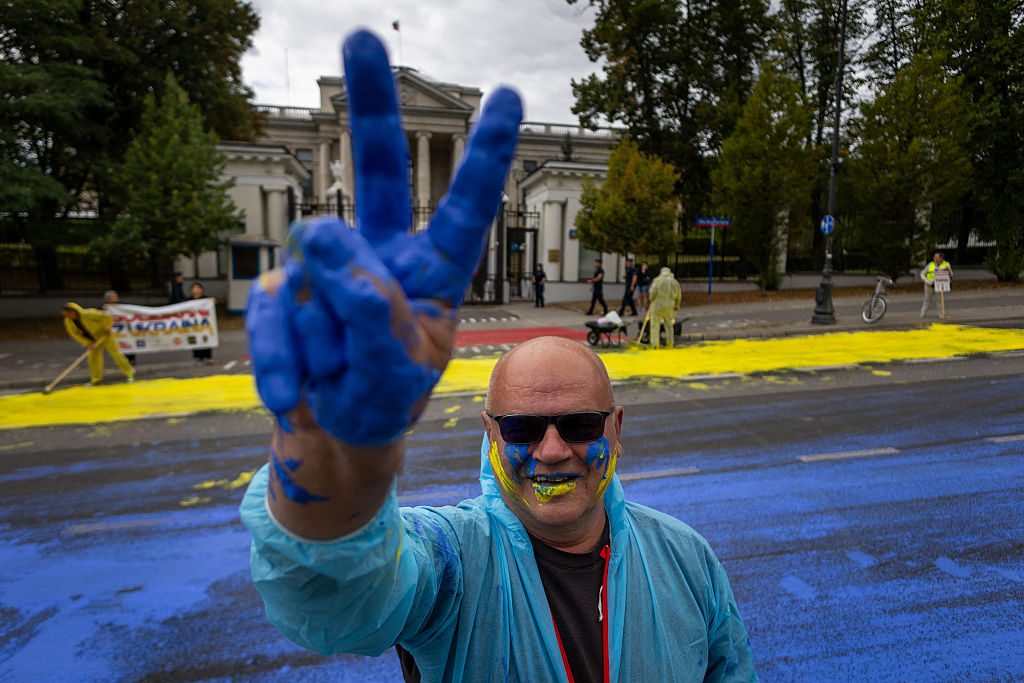The past four decades of Poland’s social history resemble a pendulum swinging between idealism and realism — and after the inspiring solidarity Poles showed Ukrainians at the outset of Russia’s invasion, it has now swung back toward narrower self-interest.
According to a new poll from last week, a slim but decisive majority of Poles, 52.7%, oppose Nato membership for Ukraine — a significant shift from 2022, when 75% of Polish citizens supported it. The divide fell largely along party lines, with most supporters of Donald Tusk’s ruling centrist coalition supporting Ukraine’s membership, and the majority of the populist opposition opposing it. That’s hardly surprising, given that, like nearly everything in Poland these days, Ukraine’s Nato membership and support for its cause in general has been filtered through the lens of the country’s frustratingly polarized and divided partisan landscape.
While Tusk reiterated Poland’s commitment to Ukrainian Nato membership as recently as June, newly inaugurated and opposition-backed President Karol Nawrocki has rejected it, choosing instead to focus on battles with Kyiv over historical issues like the unresolved legacy of the Second World War-era Volhynia massacres of Poles by Ukrainian nationalists. While Nawrocki has stated he broadly supports Ukraine’s defense against Russia, he wants the Polish-Ukrainian relationship to be an equal partnership — something he has suggested is not the case at present.
Of course, for Nawrocki and his allies, making hay of such divisions and “standing up” to Ukraine plays well with their nationalistic, conservative base, who will vote in parliamentary elections in two years. But Poles’ evolving views on Ukraine’s Nato membership go beyond mere partisanship, reflecting an instinct for self-preservation shared by states along the alliance’s eastern flank, from Estonia to Romania.
On the one hand, Poles have become more exclusive — and perhaps less imaginative — in how they define their security interests, treating the Nato defense umbrella as a zero-sum game. On the other hand, much has changed since 2022. While Poles remain gravely concerned about Russian aggression, many no longer see fighting tooth and nail for Ukraine as something that directly secures Poland itself.
The geopolitical landscape for Poland in 2025 looks markedly different than it did in 2022, and the security threats against it no longer arise directly as a result of Russia’s war next door. The border crisis manufactured by Putin’s Belarusian stooge Lukashenko along Polish frontiers has escalated, while Russian-backed acts of sabotage, arson, and hybrid warfare have roiled Poland’s security services and intelligence agencies. Last month, a Russian Shahed drone flew into Polish territory and exploded in a village only about 62 miles southeast of Warsaw. Unlike previous incursions, this one appeared to come from Belarusian airspace, rather than from Ukraine’s. For many Poles, the shadow war with Russia is already here.
While Poland has dramatically expanded its armed forces over the last decade, it remains acutely aware of its shortcomings as a military power. In the event of Russian military action against the alliance’s eastern flank, Poland would de facto be responsible not only for its own defense, but also that of the Baltic states to its north — something that has increasingly come to weigh on Poles’ minds when thinking about the future of Ukraine.
Increasingly, across the Polish political spectrum, Ukraine’s defense is playing second fiddle to Poland’s. Even Tusk recognizes this: when discussing security guarantees for Ukraine last week, he framed them mainly in terms of Poland’s security, ruling out any deployment of Polish troops after the war. Indeed, when Nawrocki visited Trump in Washington last week, Ukraine was hardly on the agenda — instead, the Polish president beamed when Trump vowed to keep American troops stationed in Poland, with a view to sending even more.
With conflict already at its gates, Poland is increasingly coming to the view that Nato may not be able to defend both Ukraine and Poland at once. For years, conventional wisdom held that the two countries were stronger together. But in an age when states are increasingly out for themselves, many Poles — like others across the region — now see the choice as us or them.











Join the discussion
Join like minded readers that support our journalism by becoming a paid subscriber
To join the discussion in the comments, become a paid subscriber.
Join like minded readers that support our journalism, read unlimited articles and enjoy other subscriber-only benefits.
Subscribe